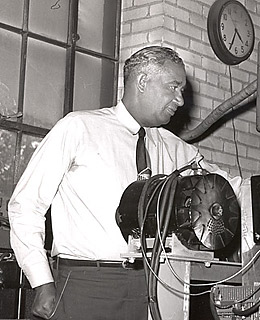
While at the supermarket, most people take for granted that their food and its additives not only had to be transported from another location, but that it had to be kept at a low temperature to prevent spoilage. Refrigerating food is a very old idea, but up until the middle of the 20th century, nobody had figured out how to transport perishables over a long distance. Frederick Jones found a way and transformed American industry.
Jones was born in 1892 just outside of Cincinnati. Orphaned at age nine, Jones lived with a Catholic priest who sparked his interest in mechanics. But unhappy with the rigors of a seminary, he ran away at 11 and got a job in an auto shop, where he turned out to be a natural mechanic. By age 15, he was helping to manage the garage, but got fired a few years later for his dual enthusiasm — and experimentation — with racecar driving.
Returning from service in World War I to Hallock, Minn., Jones worked as the town's movie projectionist and designed devices that adapted silent film to audio stock, and eventually developed equipment that further advanced film soundtracks.
One day, Joseph Numero, the owner of a Minneapolis company that made sound equipment for theaters, noticed Jones' skills and hired him to help keep up with the rapid changes in the film industry. Not only did Jones put Numero ahead of the business, he was also granted a patent for a ticket machine that returned change to customers.
During the summer of 1938, Jones began to wonder why nobody had invented air conditioning for cars, an idea he took to a then un-interested Numero. But his mind changed when a golfing buddy complained that he couldn't ship perishable foods, to which Numero jokingly replied that he should put a refrigerator in his truck.
Numero's friend returned with an aluminum truck and showed it to Jones who said a transportation refrigerator could be developed, mounted to the vehicle and built to withstand shocks. After Jones received the patent in 1940, the system was adapted to ships and rail cars, spawning entire industries based on the new ability to transport perishable food.
Numero sold his film equipment company to go into business with Jones and the two formed the U.S. Thermo Control Company, which later became the Minneapolis-based Thermo King Corp. He later modified the device so that food and blood supply could be dropped behind enemy lines for waiting troops in World War II.
In total Jones was granted more than 60 patents for inventions including a defroster, a two-cycle gas engine, and a thermostat system. He later served as an consultant to both the U.S. Defense Department and the U.S. Bureau of Standards on refrigeration. Thirty years after his death in 1961, Jones was posthumously awarded the National Medal of Technology, engineering's highest honor.